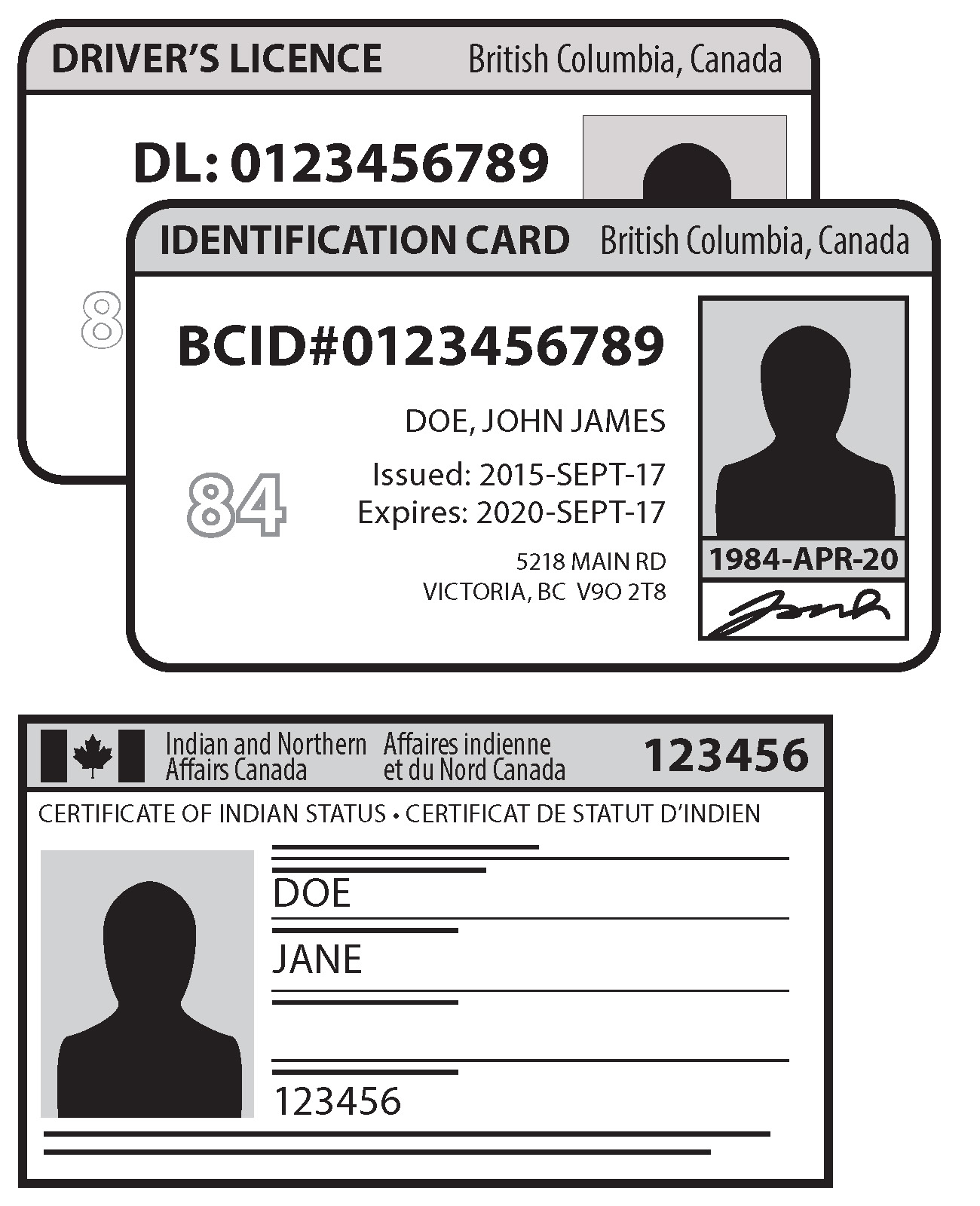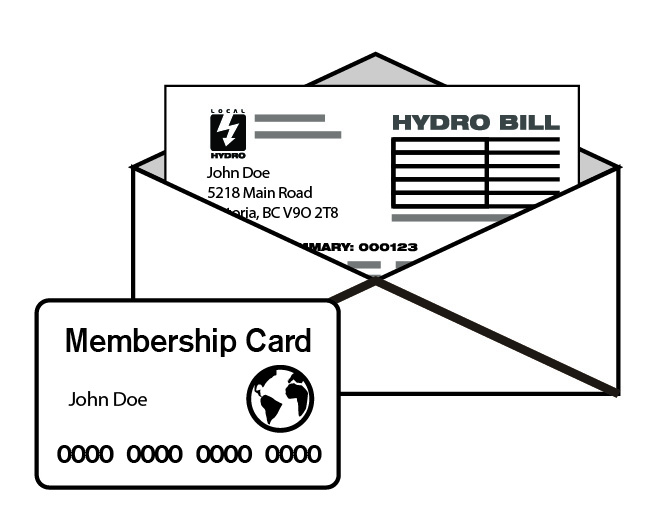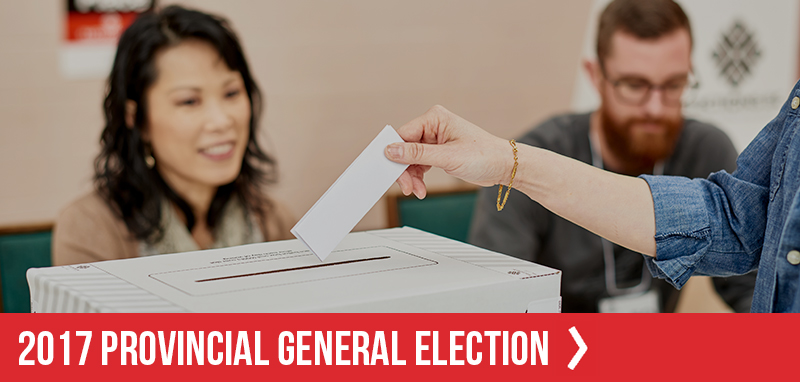**ALL INFORMATION BELOW can be found on ELECTIONS BC website: http://elections.bc.ca/
General Voting Day
is May 9
You can vote in the 2017 Provincial General Election if you are a Canadian citizen, 18 or older on General Voting Day, and a resident of B.C. for the past six months.
Voters
To vote in the 2017 Provincial General Election, you must be a Canadian citizen, 18 or older on General Voting Day, and a resident of B.C. for the past six months.
Voting in the provincial election is an important part of British Columbia’s democratic process. It is a chance for every eligible person to influence policies that affect them on a daily basis. With only a simple mark on a ballot, voting lets British Columbians decide who will represent them and what their future will look like. The right to vote is protected by the Charter of Rights and Freedoms and is one of Canada’s most cherished institutions.
New Voters
Congratulations on becoming a voter! Whether you’re a new Canadian citizen, just turned 18, or you’ve just never voted before, we’re here to help.
- Read the Voter’s Guide for a quick overview of the election process.
- Find out what ID you need, who the candidates are, and where to vote.
- Find FAQs for students and youth here.
- Find translated information here.
What are we voting for?
Eligible voters in B.C. are voting to elect 87 Members of the Legislative Assembly. Each Member represents an electoral district (also known as a riding or constituency) and has a seat in the provincial Legislature.
After all the votes are counted for each electoral district, the political party that wins the most seats forms the the provincial government. The leader of that party becomes the Premier of B.C.
Please click on the link below to see ‘WHAT TO EXPECT WHEN YOU VOTE’
https://www.youtube.com/watch?v=E95JamSSaJY&feature=em-share_video_user
All voters must prove their identity and residential address before voting. There are three ways to do this.
Option 1
 Show one of these pieces of ID:
Show one of these pieces of ID:
- a BC driver’s licence
- a BC Identification Card (BCID)
- a BC Services Card (with photo)
- another card issued by the Government of B.C. or Canada that shows your name, photo and address
OR
- A Certificate of Indian Status

Option 2
Show any two pieces of ID or documents that both show your name. At least one must have your current address. Examples include:
Government-issue identity documents
- B.C. CareCard
- Birth certificate
- Social Insurance Number card
- Passport
- Citizenship certificate
- Old Age Security Identification card
- Canadian Forces Photo Identification card
- Firearms Possession Only Licence
- Firearms Possession and Acquisition Licence
- Veterans Affairs Canada Health Care Identification card
- Correctional Service Canada Offender Identification card
- BC Services Card (without photo)
Other government-issue documents
- Property tax assessment
- Income tax assessment notice
- Government cheque or cheque stub
- Statement of government employment insurance benefits paid
- Canada Child Tax Benefit statement
- Statement of Canada Pension Plan benefits
- Statement of Old Age Security
School, college, or university documents
- Admissions letter
- Report card
- Residence acceptance
- Transcript
- Tuition/fees statement
- Student card
Other documents
- Provincial Where to Vote card
- Bank/credit card or statement
- Personal cheque (printed by bank)
- Residential lease
- Utility bill
- Mortgage statement
- Insurance statement
- Public transportation pass
- Prescription bottle
- Membership card
- Hospital bracelet/document
- Confirmation of Residence (3007)
- Statutory declaration prepared by a lawyer or notary public attesting a voter’s identity and/or residence
Note: Electronic documents (e.g. e-bills) and electronic scans of a paper document are acceptable. Hand-written information on a document is not acceptable.
Option 3
Voters who don’t have ID can have their identity vouched for by another person.
Vouching
A voter without acceptable identification can be vouched for by another individual, known as a voucher. The voucher must be:
- a registered voter resident in the voter’s electoral district, or
- a spouse, parent, grandparent, adult child, adult grandchild or adult sibling of the voter, or
- a person with the authority to make personal care decisions for the voter.
Vouchers must provide acceptable identification. The voter and the voucher must each make a solemn declaration confirming the voter’s identity and residential address.
A voucher who is not the voter’s relative or personal care authority may only vouch for one voter. A relative may vouch for any voters who are members of their family. A personal care authority may vouch for all voters over which they have written authority.
A voter who has been vouched for may not vouch for another voter in that election.
Power of Attorney does not give an individual the authority to make personal care decisions for another person. To establish that a person has authority under the common law or an enactment to make personal care decisions for a voter as required under the Election Act, the voucher must make a solemn declaration that they have either:
- An order of the Supreme Court of British Columbia, naming the voucher and stating that the voucher has been appointed as:
a) a ‘Committee’ to manage the person of the applicant under the Patients Property Act of British Columbia; or
b) a person with the authority to make personal care decisions in respect of the applicant without reference to any statute or regulation.
Or
- A valid Representation Agreement currently in effect, naming the voucher as a representative or monitor of the applicant under the Representation Agreement Act of British Columbia.
Where to Vote
All voters can vote at any voting place in B.C. Use our Where to Vote application to find your assigned voting place or voting places close to you.

Find out where and when voting is available by:
- Using our Where to Vote application
- Using the list of advance or general voting places below
- Looking for your Where to Vote card in the mail (after April 19)
- Contacting Elections BC
Voting places
All voters have an assigned voting place for General Voting Day. Usually it is faster and easier to vote at your assigned voting place, but you don’t have to vote there if another voting opportunity is more convenient for you.
All eligible voters can vote at any advance voting place in the province. Not all advance voting places are open every day of the advance voting period. Voters can find the dates an advance voting place is open by using the tools above or checking their Where to Vote card.

